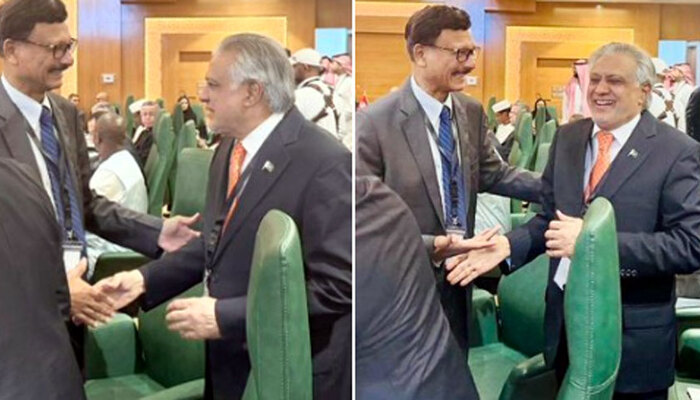Pakistan-Bangladesh relations entered a new phase of cooperation as both countries agreed to strengthen bilateral ties and expand regional partnerships. The understanding came during a high-level meeting in Jeddah between Pakistan’s Deputy Prime Minister and Foreign Minister Ishaq Dar and Bangladesh’s Advisor for Foreign Affairs Touhid Hossain. The dialogue highlighted mutual resolve to deepen engagement in diverse sectors and reaffirmed shared commitments to regional peace and prosperity.
A Meeting of Strategic Importance
The meeting was held on the sidelines of the 21st extraordinary session of the OIC Council of Foreign Ministers. Both leaders used the opportunity to review progress in ties and chart a path forward. They stressed that cooperation between Pakistan and Bangladesh is not only vital for their own development but also essential for stability in South Asia.
Their discussion underscored the need for closer political dialogue, stronger economic linkages, and greater cultural exchanges. The tone of the meeting reflected optimism and determination to build upon recent progress.
Ishaq Dar’s Message of Renewal
Following the meeting, Ishaq Dar shared his reflections on X, formerly Twitter. He emphasized that both sides reaffirmed “new momentum” in Pakistan-Bangladesh relations. Dar highlighted his optimism that cooperation would bear fruit across multiple fields.
His statement carried weight, as it echoed the growing realization that constructive engagement is the best path forward for both nations. By choosing to spotlight this development, Dar positioned the talks as a breakthrough moment rather than a routine diplomatic exchange.
Shared Vision for Regional Cooperation
The dialogue did not limit itself to bilateral ties. Both Pakistan and Bangladesh stressed the importance of advancing regional cooperation for shared prosperity. This recognition reflects a pragmatic understanding: the challenges facing South Asia—ranging from poverty to climate change—cannot be resolved in isolation.
Regional cooperation can unlock new opportunities in trade, connectivity, and energy. By agreeing to coordinate closely, Islamabad and Dhaka signaled their intent to move beyond past differences and work toward mutual benefit.
Commitment to the Palestinian Cause
Another key element of the meeting was the reaffirmation of solidarity with Palestine. Both sides expressed concern over the ongoing humanitarian crisis. They stressed the urgent need for unhindered humanitarian access, a permanent ceasefire, and a just resolution through a two-state solution.
This shared stance demonstrated that Pakistan and Bangladesh remain aligned on critical issues within the Muslim world. By raising Palestine during their bilateral meeting, both leaders emphasized that moral responsibility and foreign policy interests can move together.
Read: Pakistan Flood Relief 2025: Rising Toll and Urgent Response
Significance of the OIC Platform
The choice of venue added to the importance of the dialogue. The OIC Council of Foreign Ministers serves as a platform for unity among Muslim countries. Holding the meeting in Jeddah during an extraordinary session underlined the seriousness with which both states view their relationship.
By engaging on the sidelines of this gathering, Pakistan and Bangladesh also sent a message to the wider Muslim world: cooperation and reconciliation are possible even among states that once had difficult relations.
Moving Beyond the Past
For decades, Pakistan-Bangladesh ties carried the weight of history. Political differences, trade barriers, and occasional diplomatic freezes limited the scope of cooperation. However, the recent shift shows that both sides now prioritize pragmatism over rivalry.
The new approach recognizes that people-to-people exchanges, business partnerships, and regional collaboration are more important than revisiting past grievances. This attitude of moving forward marks a turning point in the relationship.
Opportunities in Trade and Connectivity
One of the strongest areas for future cooperation lies in trade. Both Pakistan and Bangladesh have growing economies with complementary strengths. Textile manufacturing, agriculture, and technology are sectors where joint ventures can deliver rapid results.
Enhanced connectivity—through direct shipping routes, flight links, and digital exchanges—could further boost trade. Such steps would not only strengthen bilateral ties but also connect South Asia more closely with global markets.
Cultural and Educational Ties
Cultural diplomacy offers another avenue for strengthening ties. Pakistan and Bangladesh share a rich cultural heritage rooted in language, music, and literature. Promoting student exchanges, academic collaborations, and cultural festivals can build goodwill among younger generations.
Education is an especially promising field. Scholarships, research programs, and joint academic projects can lay the foundation for a relationship that lasts beyond politics.
A Step Toward Regional Stability
Stronger Pakistan-Bangladesh relations can also influence the broader South Asian region. Improved cooperation between these two countries has the potential to ease tensions, encourage dialogue, and foster an environment of peace.
By prioritizing development and prosperity, Islamabad and Dhaka can set an example for others in the region. Their partnership can act as a counterbalance to the rivalries that often dominate South Asian geopolitics.
Looking Ahead
The recent meeting in Jeddah signaled that Pakistan and Bangladesh are ready to write a new chapter in their relationship. Both countries now share a commitment to build stronger ties, pursue regional cooperation, and speak with one voice on issues of global importance.
As momentum builds, the challenge will be to transform goodwill into practical results. Trade agreements, cultural exchanges, and political consultations will serve as the real test of this new approach.
For now, the outlook appears promising. The renewed spirit of cooperation suggests that Pakistan-Bangladesh relations are moving toward a brighter, more constructive future.
Follow us on Instagram, YouTube, Facebook,, X and TikTok for latest updates
